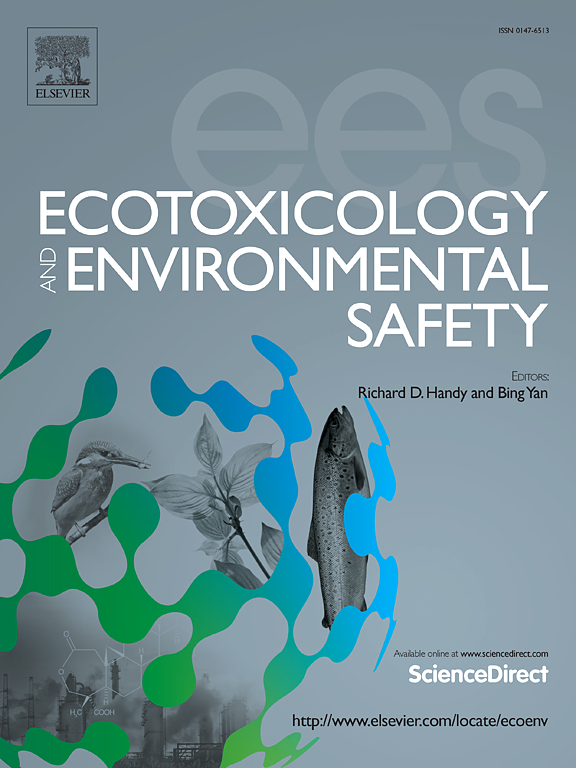非糖尿病成人全氟烷基和多氟烷基物质暴露与胰岛素抵抗之间的关系:来自 NHANES 2003-2018 的证据
IF 6.2
2区 环境科学与生态学
Q1 ENVIRONMENTAL SCIENCES
引用次数: 0
摘要
背景研究表明,全氟和多氟烷基物质(PFAS)与慢性代谢性疾病有关。本研究分析了 NHANES 2003-2018 年调查中 3909 名参与者(年龄≥20 岁)的数据,调查了血清中七种 PFAS 水平与 IR 指标(包括 HOMA-IR、HOMA-β、空腹胰岛素、QUICKI 和 TyG 指数)之间的关系。采用线性回归模型和逻辑回归模型以及限制性三次样条来评估剂量反应。加权量值和(WQS)回归和量值 g 计算(qgcomp)模型用于评估混合 PFAS 暴露与 IR 之间的关系。结果线性回归显示,成人暴露于全氟辛烷磺酸[β (95 % CI): 0.04 (0.02, 0.06)]、全氟辛酸[0.04 (0.01, 0.06)]和Me_PFOSA_AcOH[0.04 (0.02, 0.06)]与较高的TyG指数相关。值得注意的是,用 HOMA-IR >2.6评估时,Me_PFOSA_AcOH与IR呈负相关[OR (95 % CI): 0.88 (0.79, 0.98)],尽管线性回归结果并不支持这一点。当以 TyG 指数 8.6 来定义 IR 时,暴露于 PFOS、PFOA 和 Me_PFOSA_AcOH 的最高四分位数分别与 IR 风险增加 63%、42% 和 85% 相关[1.63 (1.21, 2.20);1.42 (1.06, 1.92);1.85 (1.37, 2.50)]。PFOS、PFOA 和 Me_PFOSA_AcOH 与 IR 风险呈非线性剂量反应关系。结论美国非糖尿病成年人的混合 PFAS 暴露与 IR 呈正相关,如 TyG 指数所示,尤其是 PFOS、PFOA 和 Me_PFOSA_AcOH。需要进一步研究以确定因果关系,并建议加强环境风险缓解策略以减少 PFAS 暴露。本文章由计算机程序翻译,如有差异,请以英文原文为准。
Relationship between per-fluoroalkyl and polyfluoroalkyl substance exposure and insulin resistance in nondiabetic adults: Evidence from NHANES 2003–2018
Background
Studies have linked per- and polyfluoroalkyl substances (PFAS) to chronic metabolic diseases. However, the relationship between PFAS exposure and insulin resistance (IR), a key pathophysiological basis of these metabolic diseases, in nondiabetic individuals have yet to be determined.
Methods
This study analyzed data from 3909 participants (aged ≥20) from the NHANES 2003–2018 to investigate the associations between serum levels of seven PFAS and and IR indicators, including including HOMA-IR, HOMA-β, fasting insulin, QUICKI, and TyG index. Linear and logistic regression models were used, along with a restricted cubic spline to assess dose-response. Weighted quantile sum (WQS) regression and quantile g-computation (qgcomp) models were used to assess the association between mixed PFAS exposure and IR.
Results
Linear regression revealed that elevated exposure to PFOS [β (95 % CI): 0.04 (0.02, 0.06)], PFOA [0.04 (0.01, 0.06)], and Me_PFOSA_AcOH [0.04 (0.02, 0.06)] was associated with a higher TyG index in adults. Notably, Me_PFOSA_AcOH was negatively associated with IR when assessed by HOMA-IR >2.6 [OR (95 % CI): 0.88 (0.79, 0.98)], although this was not supported by linear regression findings. When IR was defined by a TyG index >8.6, exposure to the highest quartiles of PFOS, PFOA, and Me_PFOSA_AcOH was associated with an increased risk of IR by 63 %, 42 %, and 85 %, respectively [1.63 (1.21, 2.20); 1.42 (1.06, 1.92); 1.85 (1.37, 2.50)]. PFOS, PFOA, and Me_PFOSA_AcOH demonstrated a nonlinear dose-response relationship with IR risk. The WQS and qgcomp models revealed significant positive correlations with the TyG index.
Conclusion
Mixed PFAS exposure in US nondiabetic adults was positively associated with IR, as indicated by the TyG index, particularly for PFOS, PFOA, and Me_PFOSA_AcOH. Further research is needed to establish causality, and reinforcing environmental risk mitigation strategies to reduce PFAS exposure is recommended.
求助全文
通过发布文献求助,成功后即可免费获取论文全文。
去求助
来源期刊
CiteScore
12.10
自引率
5.90%
发文量
1234
审稿时长
88 days
期刊介绍:
Ecotoxicology and Environmental Safety is a multi-disciplinary journal that focuses on understanding the exposure and effects of environmental contamination on organisms including human health. The scope of the journal covers three main themes. The topics within these themes, indicated below, include (but are not limited to) the following: Ecotoxicology、Environmental Chemistry、Environmental Safety etc.

 求助内容:
求助内容: 应助结果提醒方式:
应助结果提醒方式:


